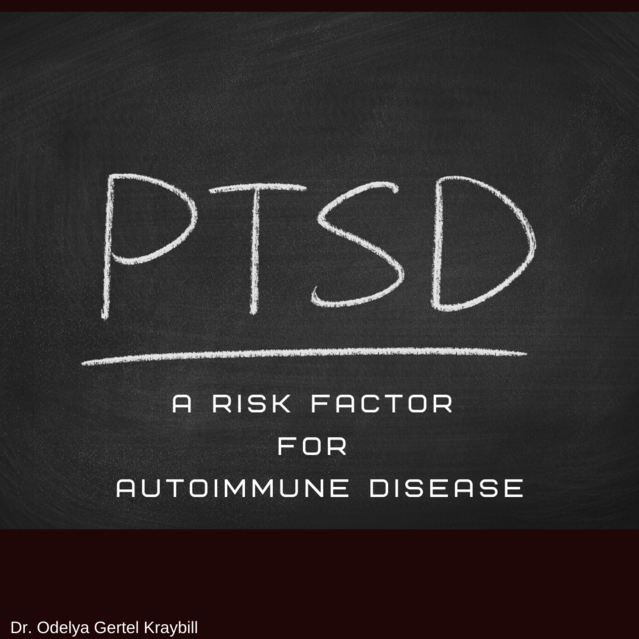Post-Traumatic Stress Disorder
PTSD May Be a Risk Factor for Autoimmune Disease
Research finds U.S. Army personnel at risk of developing autoimmune conditions.
Posted February 28, 2020 Reviewed by Devon Frye

A recent study (Boggs Bookwalter et al., 2020) finds that people suffering from PTSD may be at increased risk of developing autoimmune diseases. These findings support a growing body of evidence showing a link between PTSD, stress, and physical health.
In a previous study, for example, Song et al., (2018) analyzed more than 100,000 people who were diagnosed with stress-related symptoms. They found that, after a year, people who had a diagnosis of stress-related symptoms were significantly more likely to develop an autoimmune condition than those who did not.
PTSD and Risk of Selected Autoimmune Diseases Among U.S. Military Personnel
The current study examined the link between PTSD and the risk of developing an autoimmune condition (rheumatoid arthritis, systemic lupus erythematosus, inflammatory bowel diseases, and multiple sclerosis) in U.S. active-duty personnel. Participants in the study were enrolled in the Millennium study cohort, which investigated health effects associated with military service (2001, 2004, 2007, 2011). From the Millennium cohort, about 120,572 who were serving in active duty (when completing the baseline survey) and were not diagnosed with prior autoimmune conditions were enrolled in this study.
Participants were classified into two categories: those with PTSD and those with other mental health conditions with the exception of PTSD. At baseline, 8 percent of males and 9 percent of females were diagnosed with PTSD. Men and women with a history of PTSD were more likely to have a history of another mental health condition, combat experience, or physical or sexual trauma. Prior combat experiences were more common among males and sexual and physical trauma were more common among females (p. 3).
The authors found that U.S. personnel who were on active duty with a history of PTSD were associated with an increased risk of selected autoimmune conditions (with a time duration between baseline and follow up averaging five years) Additionally, there was an approximately 60 percent increased risk for developing autoimmune diseases for personnel with a history of PTSD relative to those without a history of PTSD (p. 3).
The authors conclude that biological changes that take place in the body of individuals with PTSD—and possibly those with high levels of stress—impact the immune system through enhanced inflammation, activated genes, and accelerated emergence of immune cells (p. 6). All of these together, they propose, indicate an association of PTSD and stress with autoimmune conditions that were similar for both survivors of combat and survivors of physical or sexual trauma.
Stress, the Gut, and Autoimmunity
On-going research on the gut may shed light on the mechanism behind the linkages reported above between PTSD and autoimmune disorders. The gut is now recognized as home to a vast microbiome of bacteria, viruses, pathogens, and fungi that interact with the brain in complex ways. When these organisms fall out of balance, the consequences can be complex. This can result from food or chemical intake, changes in body chemistry, and other factors that favor one kind of organism over others.
One result is damage to the lining of the gut, often called “leaky gut.” In a weakened condition, the intestinal walls of the gut no longer provide an impermeable barrier between the teeming microbiome within and the rest of the body. Toxins and bacteria may penetrate intestinal walls and enter the bloodstream.
This triggers a reaction of the immune system, including inflammation. Inflammation can cross the blood-brain barrier (BBB) to the brain—and this is when many mental health symptoms appear to emerge. In some individuals, inflammation triggers an overreaction in the body’s immune response. The body mistakenly begins attacking itself. Such a response can lead to an autoimmune disease.
After a misdirected autoimmune response has been triggered once, inflammation will be triggered in the future in response to even small amounts of whatever initially triggered the response. Viruses, infections, environmental toxins, stress, and trauma can trigger a renewed inflammatory response at any time. Werbner et al (2019) suggested that stress causes changes in the activity of the gut. These changes trigger immune responses from the body that can include an inflammation “attack” of the body against itself.
The latest findings contribute to an expanding body of evidence vitally important for mental health practitioners, educators, and patients. There has been a growing call to address the bio-medical root causes of inflammation as well as the autoimmune response triggered in certain individuals. These should be explored as the possible root causes of mental health symptoms.
References
Bookwalter, D. B., Roenfeldt, K. A., LeardMann, C. A., Kong, S. Y., Riddle, M. S., & Rull, R. P. (2020). Posttraumatic stress disorder and risk of selected autoimmune diseases among US military personnel. BMC psychiatry, 20(1), 23.
Song, H., Fang, F., Tomasson, G., Arnberg, F. K., Mataix-Cols, D., de la Cruz, L. F., ... & Valdimarsdóttir, U. A. (2018). Association of stress-related disorders with subsequent autoimmune disease. Jama, 319(23), 2388-2400.
Werbner, M., Barsheshet, Y., Werbner, N., Zigdon, M., Averbuch, I., Ziv, O., ... & Koren, O. (2019). Social-Stress-Responsive Microbiota Induces Stimulation of Self-Reactive Effector T Helper Cells. mSystems, 4(4), e00292-18.




